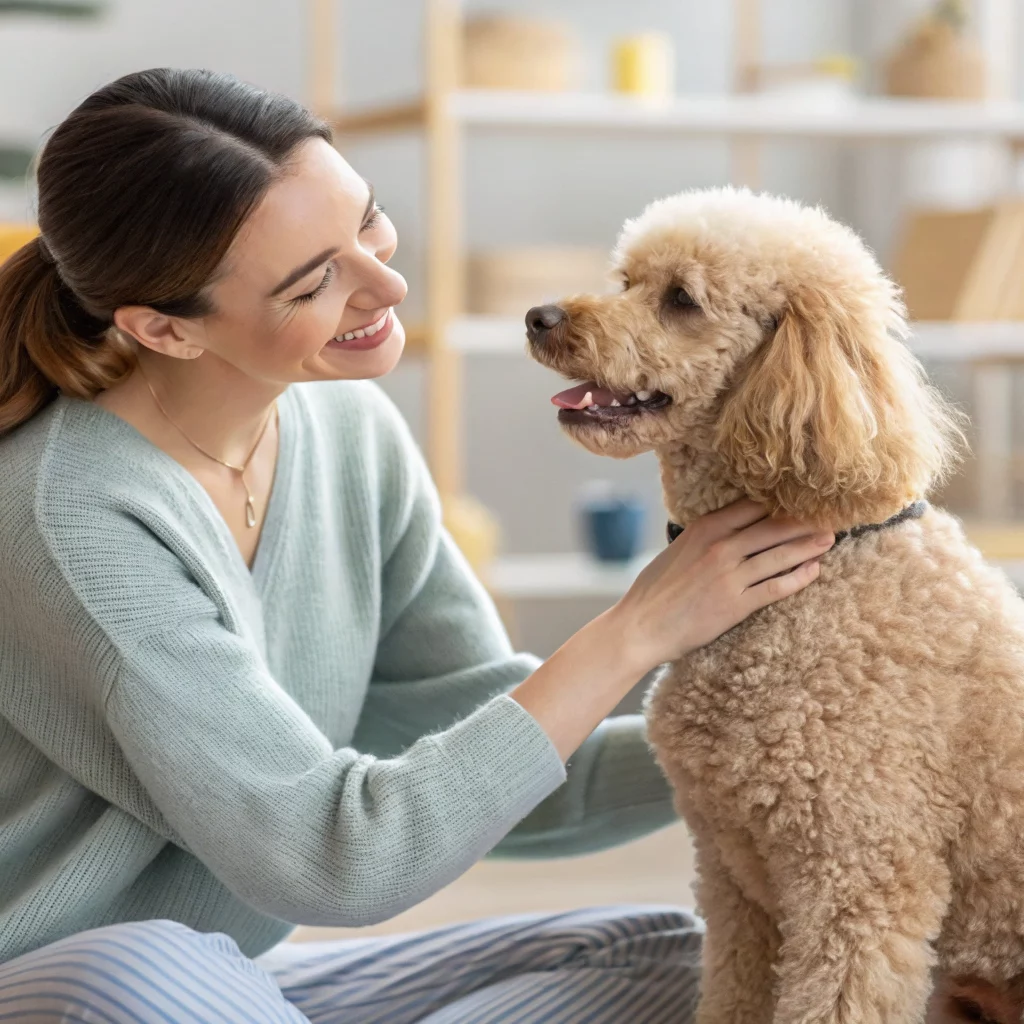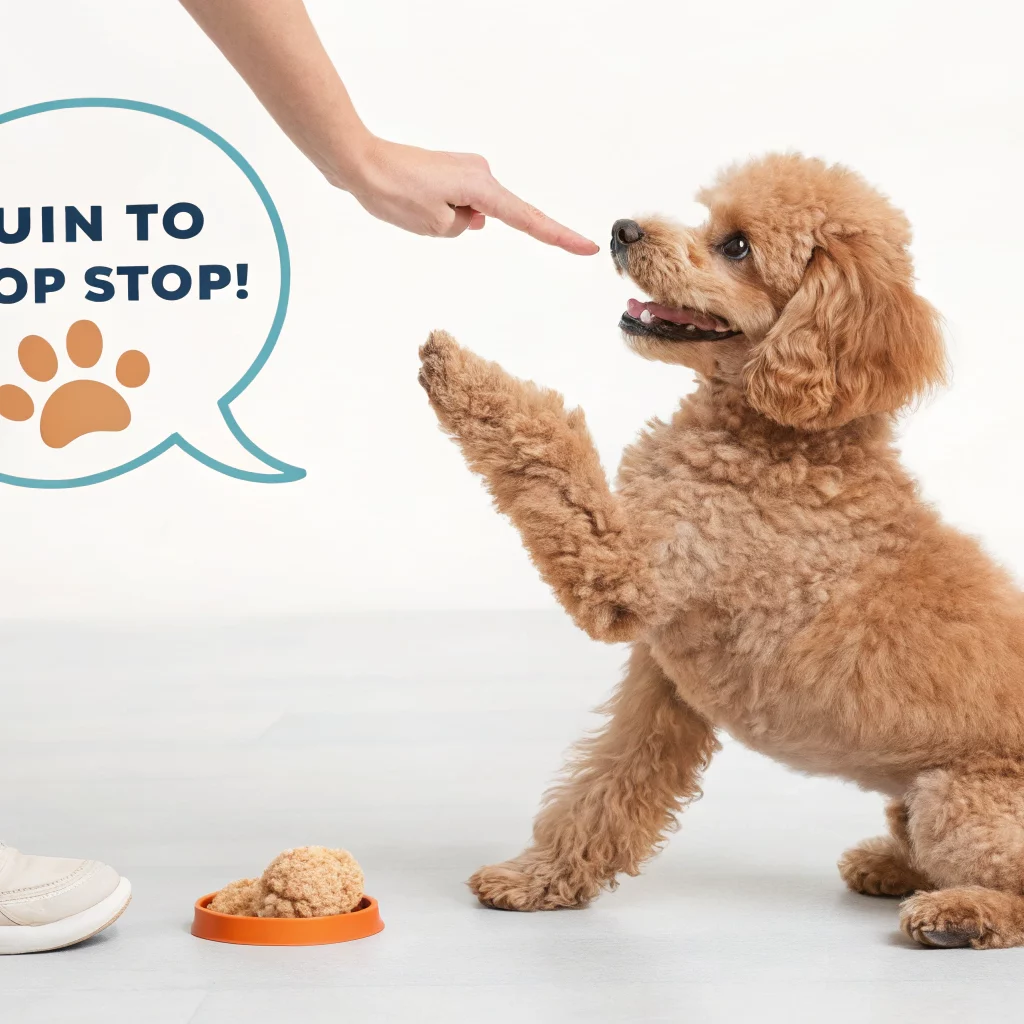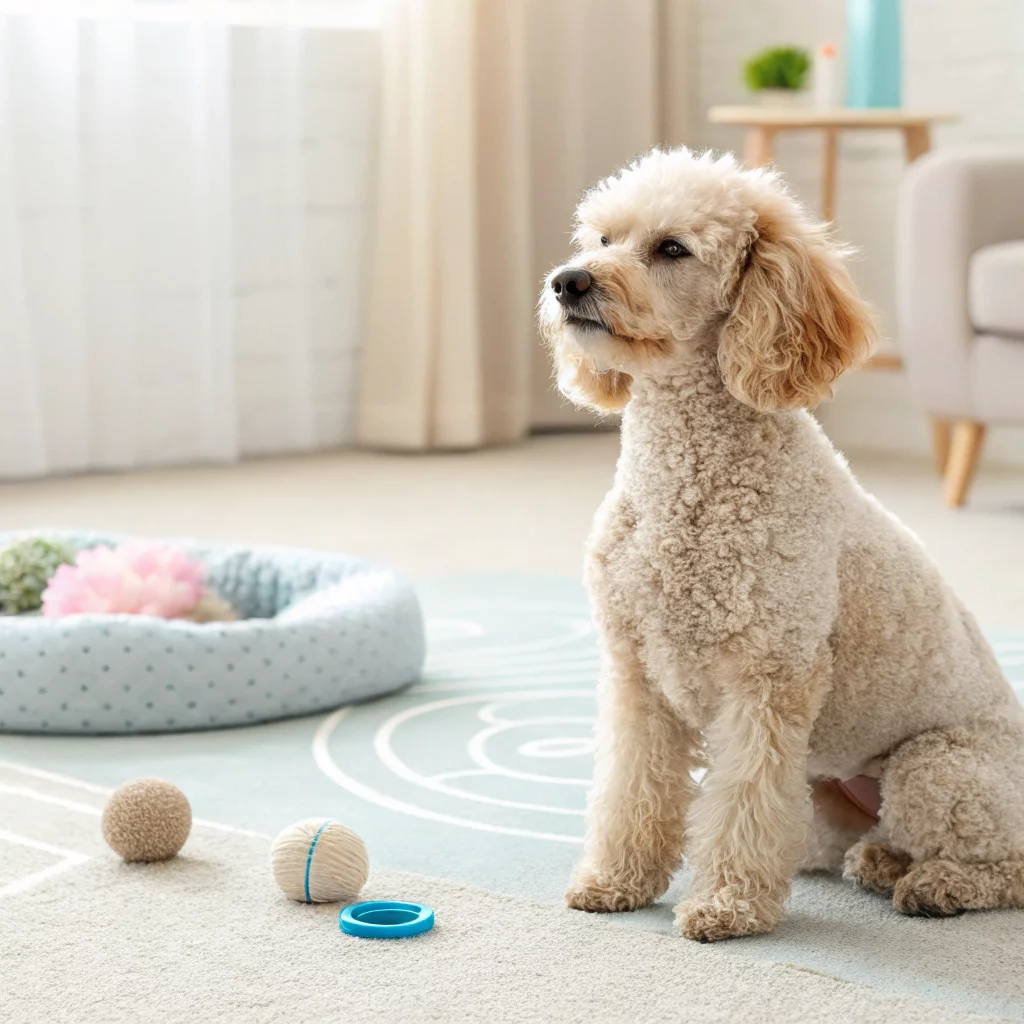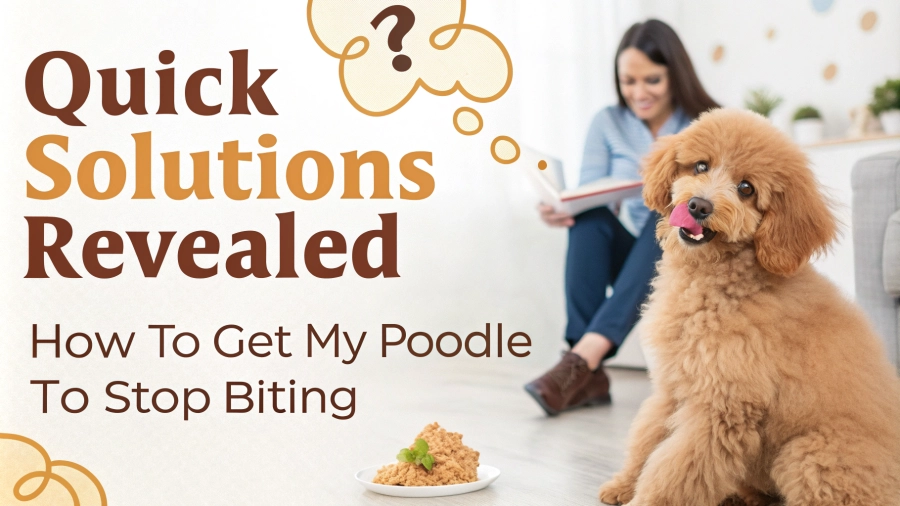Is your poodle biting more than you’d like? Stopping this behavior quickly is possible.
Dogs bite for many reasons, and poodles are no exception. They might bite out of fear, boredom, or teething. Understanding the cause can help you find the right solution. Biting can be frustrating, especially if it happens often. But don’t worry! There are simple steps you can take to help your poodle stop biting.
This guide will offer quick and effective solutions. You’ll soon enjoy a calmer, bite-free pet. Ready to learn how? Let’s dive in!

Identifying The Cause
Understanding why your poodle bites is the first step to stop it. Identifying the cause helps you choose the right solution. Here are some common reasons your poodle might be biting.
Puppy Teething
Teething is a natural process for puppies. During this stage, they feel discomfort and bite to relieve it. Here are some signs your poodle is teething:
- Chewing on furniture
- Drooling more than usual
- Red or swollen gums
Providing proper teething toys can help. Choose safe, durable toys. Avoid toys that can break into small pieces.
Behavioral Issues
Sometimes, biting is due to behavioral problems. These issues can stem from several factors. Here are common behavioral causes:
| Cause | Description |
|---|---|
| Fear | Dogs bite when scared or threatened. |
| Play Aggression | Some dogs bite during play. |
| Lack of Training | Untrained dogs may not know biting is bad. |
Addressing these issues requires patience and consistency. Training sessions can help correct unwanted behavior. Reward good behavior with treats or praise.

Training Techniques
Training your poodle to stop biting is crucial for a harmonious home. Effective training techniques can help you achieve this goal. Below, we’ll explore two proven methods: Positive Reinforcement and Redirection Methods. These techniques are easy to understand and implement.
Positive Reinforcement
Positive reinforcement means rewarding your poodle for good behavior. This method encourages them to repeat the good actions. Follow these steps:
- Identify the behavior you want to encourage.
- Use treats or affection as rewards.
- Be consistent with your rewards.
For example, give your poodle a treat when they play gently. Use a cheerful voice to praise them. Consistency is key. Always reward the good behavior immediately. This helps your poodle understand what pleases you.
Redirection Methods
Redirection involves diverting your poodle’s attention from biting to a more acceptable activity. This method is useful and simple to apply. Try these techniques:
- Offer a toy when your poodle starts to bite.
- Engage in a different activity like a game of fetch.
- Use commands like “Leave it” to stop unwanted biting.
For example, if your poodle bites your hand, replace your hand with a chew toy. Praise them when they bite the toy instead. This teaches them that toys are for biting, not hands. Regular practice makes this technique effective.
By using these training techniques, you can teach your poodle to stop biting. Consistency and patience are essential. Your poodle will learn to behave better, making your home more peaceful.
Providing Chew Toys
Getting your poodle to stop biting can be a challenge. One effective solution is to provide chew toys. These toys can help redirect your poodle’s biting behavior. They offer a safe outlet for their chewing needs. Let’s explore how to choose the right toys and what safe chew options are available.
Choosing The Right Toys
Picking the right chew toys for your poodle is crucial. Not all toys are suitable for every dog. Consider the size and strength of your poodle. Some toys are designed for small dogs, while others are for larger breeds.
- Size: Ensure the toy is not too small to avoid choking hazards.
- Material: Look for durable materials that can withstand heavy chewing.
- Texture: Different textures can keep your dog entertained and engaged.
Safe Chew Options
Safety is the top priority when choosing chew toys. Unsafe toys can cause harm to your poodle. Here are some safe options:
| Type of Toy | Description |
|---|---|
| Rubber Toys | Durable and long-lasting, perfect for strong chewers. |
| Rope Toys | Great for tug-of-war and chewing, but monitor for fraying. |
| Nylon Bones | Designed to be chewed on, safe and durable. |
| Edible Chews | Provide a tasty treat while satisfying chewing needs. |
Always supervise your poodle with new toys. Ensure they do not break into small, harmful pieces. Regularly check toys for wear and replace them if necessary. This keeps your poodle safe and satisfied.
Setting Boundaries
Setting boundaries is crucial for training your poodle to stop biting. Clear boundaries help your poodle understand what is acceptable behavior. This reduces confusion and fosters a positive environment. Let’s dive into some effective techniques.
Consistent Rules
Consistency is key in dog training. Establish clear, consistent rules for your poodle. Everyone in the household should follow these rules to avoid mixed signals.
- Use the same commands and gestures.
- Do not allow biting during playtime.
- Reward good behavior consistently.
Consistency helps your poodle learn faster. It makes the training process smoother.
Using Commands
Commands are essential tools in setting boundaries. They guide your poodle’s behavior. Start with basic commands like “no” or “stop.” Use a firm yet calm voice.
Here’s a simple table to illustrate some common commands:
| Command | Action |
|---|---|
| No | Immediately stop the action. |
| Stop | Cease any movement or activity. |
| Leave it | Ignore or avoid the object or activity. |
Use treats as positive reinforcement. Reward your poodle when they obey commands. This strengthens the association between command and action.
Remember, patience and persistence are key. Your poodle will learn and adapt over time.
Socializing Your Poodle
Socializing your poodle is key to reducing biting. A well-socialized poodle is less likely to bite out of fear or anxiety. This section will cover two effective methods: puppy playdates and exposure to new environments.
Puppy Playdates
Puppy playdates are a great way to socialize your poodle. These playdates allow your poodle to interact with other dogs. This helps in teaching them acceptable behavior.
- Set up playdates with well-behaved dogs.
- Supervise the interactions to ensure safety.
- Reward your poodle for good behavior.
Regular playdates can build your poodle’s confidence. They learn how to play without biting. This social skill is important for their overall behavior.
Exposure To New Environments
Exposing your poodle to new environments reduces their fear. A confident poodle is less likely to bite. Here are some ways to expose your poodle to new environments:
- Take them on walks in different areas.
- Visit parks, pet stores, and other dog-friendly places.
- Introduce them to new people and animals gradually.
Each new experience should be positive. Use treats and praise to reward calm behavior. This helps your poodle feel safe and secure.
Socializing your poodle is a crucial step in preventing biting. Puppy playdates and exposure to new environments can make a big difference. With patience and consistency, your poodle will become a well-behaved companion.
Professional Help
Sometimes, training your poodle to stop biting needs professional help. Experts can provide effective strategies and techniques. Here are some professional options to consider.
Hiring A Trainer
Hiring a dog trainer can be a great investment. Trainers have experience dealing with biting issues. They can quickly identify the root cause of the problem. A professional trainer will create a customized plan for your poodle. This plan will focus on reducing and eventually stopping the biting behavior.
Here are some benefits of hiring a trainer:
- Personalized training sessions.
- Faster results due to expert techniques.
- Increased confidence in handling your poodle.
- Improved understanding of your dog’s behavior.
When choosing a trainer, consider their qualifications and experience. Look for positive reviews and ask for references. Ensure they use positive reinforcement methods. This approach is kinder and more effective.
Veterinary Advice
Sometimes, biting can be a sign of a medical issue. It’s important to rule out any health problems. A visit to the veterinarian can help identify any underlying conditions. These conditions might be causing pain or discomfort to your poodle.
Here are some common health issues that may lead to biting:
- Dental problems.
- Skin allergies.
- Arthritis or joint pain.
- Neurological issues.
Your vet may recommend a thorough examination. They might also suggest specific treatments or medications. This can help alleviate any pain or discomfort your poodle is experiencing. In some cases, a combination of medical treatment and training may be necessary.
By seeking professional help, you can address the biting behavior effectively. Both trainers and veterinarians play a crucial role in this process. With their guidance, your poodle can become a well-behaved and happy companion.
Managing Stress
One of the reasons your poodle may be biting is due to stress. Managing stress is crucial to prevent this behavior. Let’s explore some effective methods to help your poodle feel calm and secure.
Creating A Calm Environment
A calm environment can greatly reduce your poodle’s stress levels. Here are some tips to create a peaceful space for your poodle:
- Provide a quiet area with minimal noise.
- Use comfortable bedding and toys.
- Maintain a consistent routine.
Consider playing soft music or using a white noise machine. These can mask outside noises that might stress your poodle. Ensure your poodle has a designated safe spot where they can retreat and relax.
Recognizing Stress Signals
Recognizing stress signals in your poodle is essential. This helps you take action before biting occurs. Common signs of stress include:
| Stress Signal | Description |
|---|---|
| Panting | Heavy breathing, even without exercise. |
| Pacing | Walking back and forth repeatedly. |
| Whining | Frequent vocalizations or crying. |
| Yawning | Excessive yawning when not tired. |
Early detection of these signals allows you to intervene. Remove your poodle from the stressor and provide comfort. Offer a treat or a favorite toy to distract them.
By creating a calm environment and recognizing stress signals, you can help your poodle feel secure. This is a crucial step in stopping biting behavior.

Consistency And Patience
Training your poodle to stop biting requires consistency and patience. These two elements are crucial for effective behavior modification. Without them, progress can be slow and frustrating. Let’s explore how maintaining routine and celebrating small wins can help you achieve success.
Maintaining Routine
Consistency is key in training. Establish a daily routine for your poodle. This helps them understand what to expect and what is expected of them. A structured routine makes training sessions more effective.
Here’s a simple routine you can follow:
| Time | Activity |
|---|---|
| Morning | Short walk and feeding |
| Mid-morning | Training session (10 minutes) |
| Afternoon | Playtime and socialization |
| Evening | Training session (10 minutes) and feeding |
| Night | Calm time and bedtime |
Stick to this routine daily. Over time, your poodle will learn the behaviors you expect. Consistency in commands and rewards is also important. Always use the same words and actions to reinforce good behavior.
Celebrating Small Wins
Patience goes hand-in-hand with consistency. Training can be slow, so celebrate small wins. Every time your poodle responds well, give them a reward. This could be a treat, praise, or a favorite toy.
Here are some ways to celebrate:
- Verbal praise: Use a happy tone to say “Good job!”
- Treats: Small, healthy treats are great incentives.
- Playtime: A few minutes of play can be a great reward.
Tracking progress helps you stay motivated. Keep a journal of your poodle’s improvements. Note down each small win. This helps you see how far you’ve come and keeps you focused on your goal.
Combining consistency and patience will make a big difference. Your poodle will learn not to bite, and you will build a stronger bond with them.
Frequently Asked Questions
Why Is My Poodle Biting?
Poodles may bite due to teething, playfulness, or anxiety. Identifying the cause helps in addressing the behavior effectively.
How Can I Stop My Poodle From Biting?
Use positive reinforcement, consistent training, and provide chew toys. Avoid punishing your poodle to prevent fear-based biting.
Are Poodles Known For Biting?
Poodles are not typically known for biting. However, without proper training and socialization, any dog can develop this habit.
Can Professional Training Help Stop Biting?
Yes, professional training can be very effective. Trainers can provide tailored strategies to address biting behavior in poodles.
Conclusion
Stopping your poodle from biting takes patience and consistency. Use positive reinforcement. Offer toys to redirect their biting. Socialize them with other dogs. This helps reduce anxiety. Always stay calm and assertive. Remember, training takes time. Your poodle will learn with practice and love.
Keep sessions short and fun. Enjoy the journey with your furry friend. Consistent effort brings positive results. Your bond will strengthen, and biting will decrease. Happy training!

